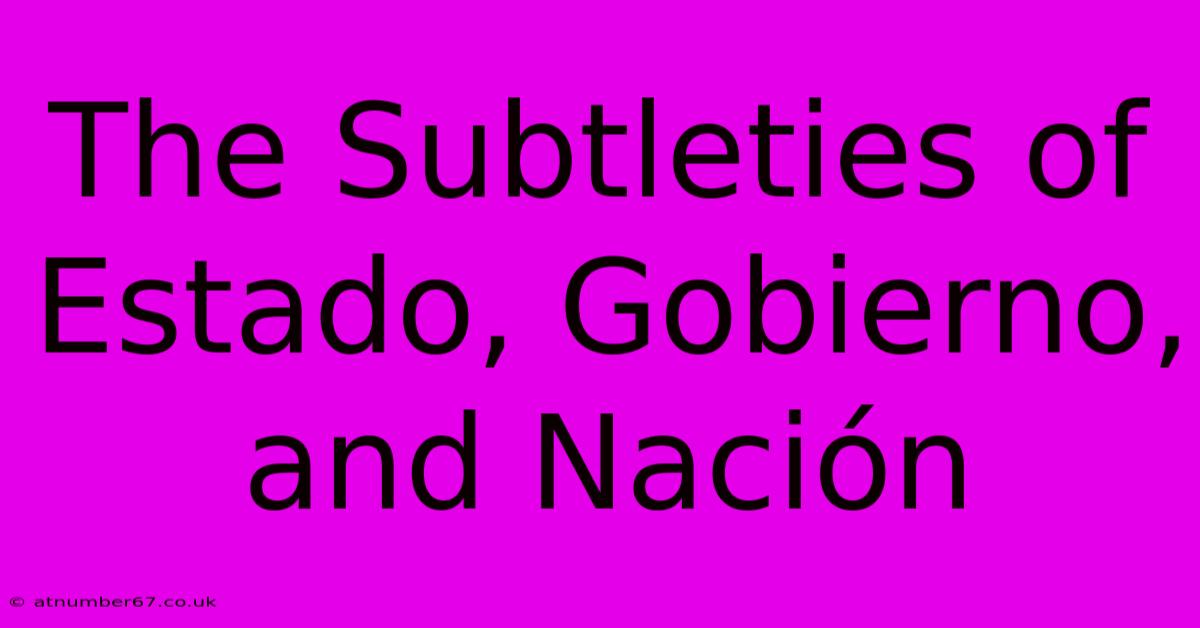The Subtleties Of Estado, Gobierno, And Nación

Table of Contents
The Subtleties of Estado, Gobierno, and Nación: Understanding the Nuances of Spanish Political Terminology
Understanding the Spanish terms Estado, Gobierno, and Nación is crucial for anyone seeking a deep understanding of Spanish-speaking politics, history, and culture. While often used interchangeably in casual conversation, these words possess distinct meanings that reflect fundamental differences in the structure and function of power. This article will delve into the subtleties of each term, clarifying their individual connotations and exploring how they relate to one another.
Estado: The Permanent Entity
Estado, in its political context, translates most accurately to "state" in English. It represents the permanent, overarching entity encompassing the entire system of government, including its institutions, laws, and territory. Think of it as the abstract concept of the political entity itself, existing beyond the changes of any particular administration. The Estado embodies:
- Sovereignty: The supreme authority within a defined territory.
- Territory: The geographical area under the state's control.
- People: The population residing within the state's territory, regardless of their political affiliations.
- Institutions: The permanent structures of government, including the judiciary, legislature, and executive branches (which are themselves distinct from the Gobierno).
Key Characteristics of the Estado:
- Continuity: The Estado endures beyond changes in government.
- Legitimacy: Its authority rests on a foundation of law and tradition.
- Monopoly on force: The Estado holds a legal monopoly on the legitimate use of force within its territory.
Gobierno: The Temporary Administration
Gobierno translates to "government" and refers to the group of individuals currently in power, responsible for managing the affairs of the Estado. This is the temporary, acting body executing the laws and policies of the Estado. The Gobierno is:
- Executive: Primarily focused on implementing laws and policies.
- Transient: Its composition changes with elections or other shifts in power.
- Instrumental: It acts as the instrument through which the Estado operates.
Key Differences from the Estado:
- Short-term focus: The Gobierno operates within a limited timeframe.
- Political nature: Its composition and actions are subject to political influence and change.
- Accountability: The Gobierno is accountable to the people and the institutions of the Estado.
Nación: The Shared Identity
Nación translates most closely to "nation", denoting a community of people bound by shared cultural characteristics, such as language, history, traditions, and a sense of collective identity. This shared identity might or might not align with the boundaries of the Estado:
- Cultural unity: The foundation of a Nación is a shared culture and sense of belonging.
- Possible divergence from Estado: A single Nación may encompass multiple Estados, or vice versa; a single Estado may contain multiple Naciones.
- Self-determination: The concept of Nación is often linked to aspirations for self-determination and national sovereignty.
Key Distinctions from Estado and Gobierno:
- Non-political (primarily): While a Nación can influence the political landscape, it's fundamentally a cultural entity.
- Transcends political boundaries: A Nación can exist independently of formal political structures.
- Emotional and symbolic: Nación represents a strong emotional and symbolic connection among people.
The Interplay of Estado, Gobierno, and Nación
The relationship between Estado, Gobierno, and Nación is complex and dynamic. The Gobierno governs the Estado, which provides the framework for political existence. Meanwhile, the Nación influences the Estado and the Gobierno through its cultural weight and political engagement. A stable and effective political system requires a balance between these three elements: a strong Estado providing stability, a responsible Gobierno upholding the laws, and a cohesive Nación providing a sense of shared identity and purpose. Misalignments between these elements can lead to political instability and social unrest.
Understanding these subtle distinctions is crucial for comprehending the political dynamics of Spanish-speaking countries and societies. By grasping the nuances of each term, we can gain a much richer perspective on the complexities of power, culture, and governance.

Thank you for visiting our website wich cover about The Subtleties Of Estado, Gobierno, And Nación. We hope the information provided has been useful to you. Feel free to contact us if you have any questions or need further assistance. See you next time and dont miss to bookmark.
Featured Posts
-
Cheesy Dad Jokes For All Ages And Stages
Apr 03, 2025
-
Marvel Contest Of Champions Hack No Human Verification
Apr 03, 2025
-
Liam Hemsworths Daughter Her Personal Journey
Apr 03, 2025
-
Ej Laure Age Wisdom And The Future
Apr 03, 2025
-
Meghan Markles Net Worth A Surprising Revelation
Apr 03, 2025
